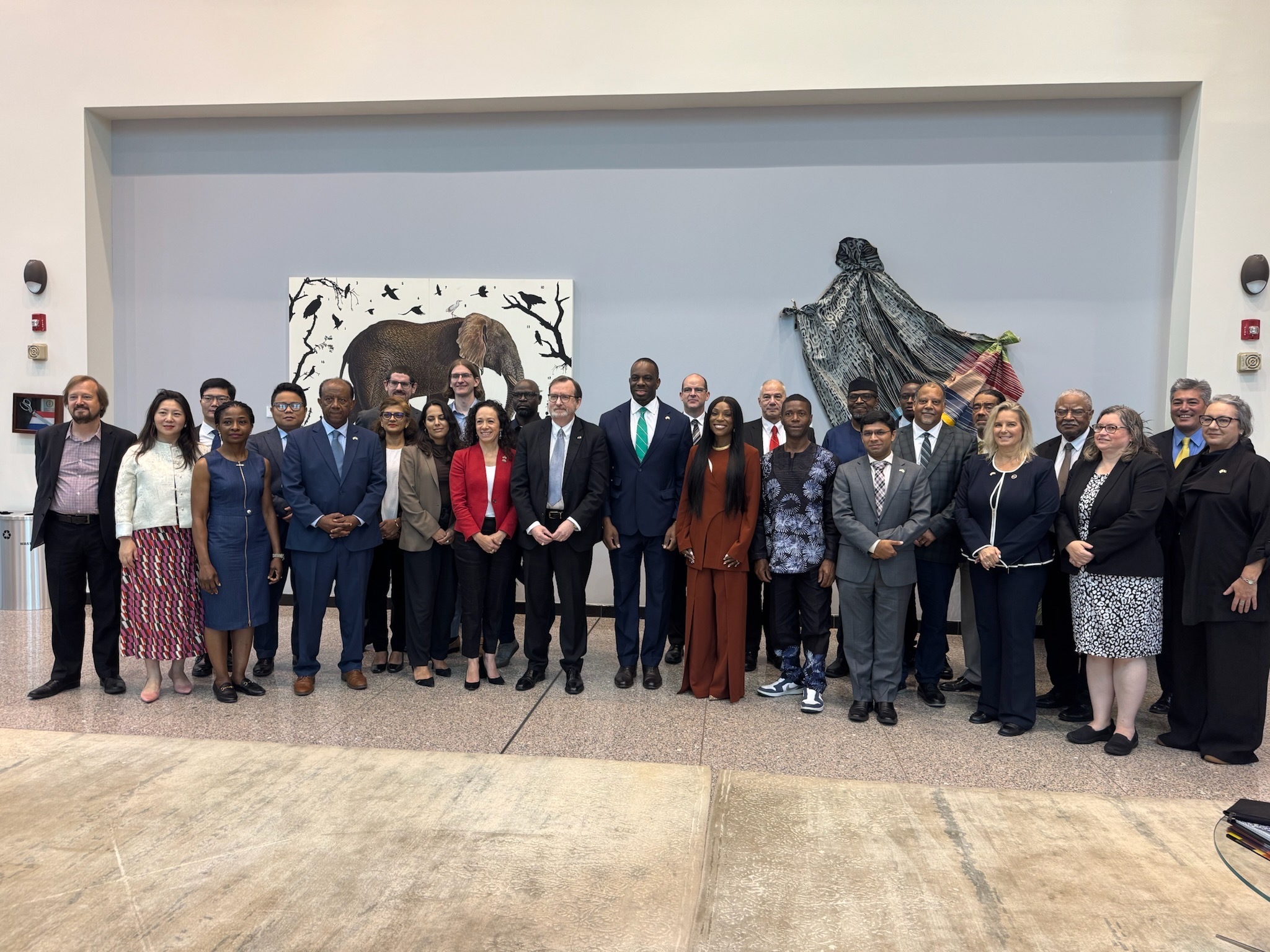
Left to right, Secretary Toks Omishakin, Autodesk CMO Dara Treseder, Minister Bosun Tijani, and Autodesk Chief Sustainability Officer Joe Speicher gather for the signing of a Memorandum of Understanding (MOU) that will unlock opportunities between Autodesk and Nigeria’s Federal Ministry of Communications, Innovation & Digital Economy.
Nigeria is one of the fastest-growing countries on the planet. By 2050, it’s projected to be home to nearly 400 million people, making it the third-most-populous nation. Meeting the needs of that growth—from modern infrastructure to climate-resilient cities—will require bold ideas and strong partnerships.
That’s why Autodesk has signed a Memorandum of Understanding (MOU) with Nigeria’s Federal Ministry of Communications, Innovation & Digital Economy to explore how digital technology can help build smarter, more sustainable infrastructure. Together, we’ll work to understand the country’s most pressing challenges, and how digital delivery can unlock economic growth and design a future that matches Nigeria’s ambitions.
This collaboration builds on momentum created by the State of California’s leadership in strengthening climate and economic ties across Africa. Earlier this year, I traveled to Abuja as part of an official Californian delegation led by California Secretary of Transportation Toks Omishakin, which brought government and industry leaders together to explore new opportunities for innovation and partnership. That visit laid the groundwork for what we celebrated last week in New York during Climate Week: a shared commitment between Autodesk and the Ministry, led by Minister Bosun Tijani, to harness technology and innovation to design and make a better future for Nigeria and its people.

Autodesk CMO Dara Treseder meets with leaders from the California – Africa Climate and Economic Partnership in Nigeria.
Technology at the heart of progress
Governments everywhere are under pressure to deliver infrastructure that can withstand climate change, keep pace with population growth, and fuel economic growth and resilience. From highways and railways to bridges, energy systems, and urban networks, meeting that demand requires new ways of designing and making—and technology is what makes it possible at scale.
Through this collaboration, Autodesk will explore pilot initiatives with the Nigerian government to bring its global expertise in Design and Make technologies—including Building Information Modeling (BIM), AI, digital twins, and cloud-connected workflows—and share best practices that can accelerate project delivery, improve transparency, and embed sustainability from the start. Working with the Ministry, Autodesk aims to build capacity, strengthen public works, and ensure infrastructure meets the needs of a rapidly growing nation.
Some of Nigeria’s most ambitious projects, like “Project Bridge” and the modernization of major airports, will require technology as a catalyst for long term, sustainable development. Alongside partners like BIMAfrica, Autodesk and the Nigerian government will look to advance BIM adoption and best practices across the public sector—essential for improving efficiency, controlling costs, and increasing transparency.
This will build on Autodesk’s existing work in Nigeria to amplify the impact of national infrastructure efforts and create a more sustainable, prosperous future. For example, through our Autodesk Foundation partner Build Health International, we are helping design and build the new African Centre of Excellence for Genomics of Infectious Diseases (ACEGID). The eight-building expansion will add new research, teaching, and housing facilities—paving the way for a pan-African early-warning system to identify and monitor disease threats. And through its partnership with Acumen, for example, the Foundation has supported Amped Innovation, which builds rugged, dust-resistant, pay-as-you-go solar generators tailored to Nigeria’s environment—expanding access to clean, reliable energy for families and businesses.
Empowering the workforce that will build the future
Progress starts with people—and scaling Nigeria’s infrastructure will require a workforce ready to meet that challenge. A core part of this MOU explores ways Autodesk can help expand access to cutting-edge tools, skills, and training so Nigeria’s emerging talent can step into the high-demand jobs that will power the country’s next chapter.
That work begins within government. Together with the Ministry, Autodesk can help increase the digital capabilities of public agencies and their teams, ensuring those leading Nigeria’s infrastructure build-out have the skills and technology they need to deliver.
But it extends beyond government: with one of the youngest populations in the world, Nigeria’s people are its greatest resource. Building their skills is critical to delivering the scale of infrastructure this moment demands—and ensuring the benefits of that growth are widely shared. Around the world, Autodesk provides students and educators with free access to our software and training resources, giving tens of millions of future designers, engineers, and makers the tools to learn and innovate. Extending this same approach to Nigeria will help equip young people with the skills needed to design, build, and sustain the infrastructure of the future. The sooner we expand access to tools and hands-on learning, the sooner we’ll build the workforce ready to design and make the cities of tomorrow.
This work is just the beginning. The work we do together will shape Nigeria’s future—and set a powerful example of what’s possible for communities everywhere.